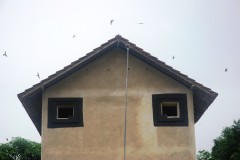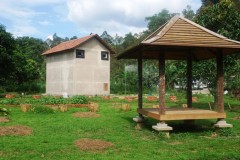Nov 05, 2009
Caviar of the East - The Newly Weds Came
On 30th Oct we switched on the sounds on a permanent basis. Today, we noticed the droppings of at least 10 pairs of newly weds. This must surely break all records for the time it takes for the walit to take up home in a man-made structure.
The walit in a farm like DQ provides a useful function in keeping the insect population low. We first noticed the walit when we were scratching our heads as to why our honey bees just keep on disappearing. Then we put two and two together.
Completed walit house plus garden.
15:49 Posted in Blog | Permalink | Comments (3) | Tags: swiftlet farming, walit










Comments
bees and birds ... do you foresee any impact to fruit trees ? what i mean is walit eat flying insects, less insects = maybe less pollination = maybe less fruit. interested in factual instead of theoretical response. after all, there's billions of insects :-)
Posted by: azman | May 07, 2010
Dont know of any studies done on this. Theoretically, a balance will be reached beyond which the insect population will not be able to support. Walits do not fool around like we humans. We do selective breeding of bees until they become so genetically similar that they cannot withstand adverse environmental events resulting in die-offs and lose of pollination populations.
Posted by: HS | May 25, 2010
I have read your blog, I really admire your research on bird incubating and bird breeding. Can you explain how to help the Swiftlet chicks to integrate into the bird colony ? How much the success rate? Thanks.
Posted by: Hoang Viet | Oct 24, 2010
The comments are closed.